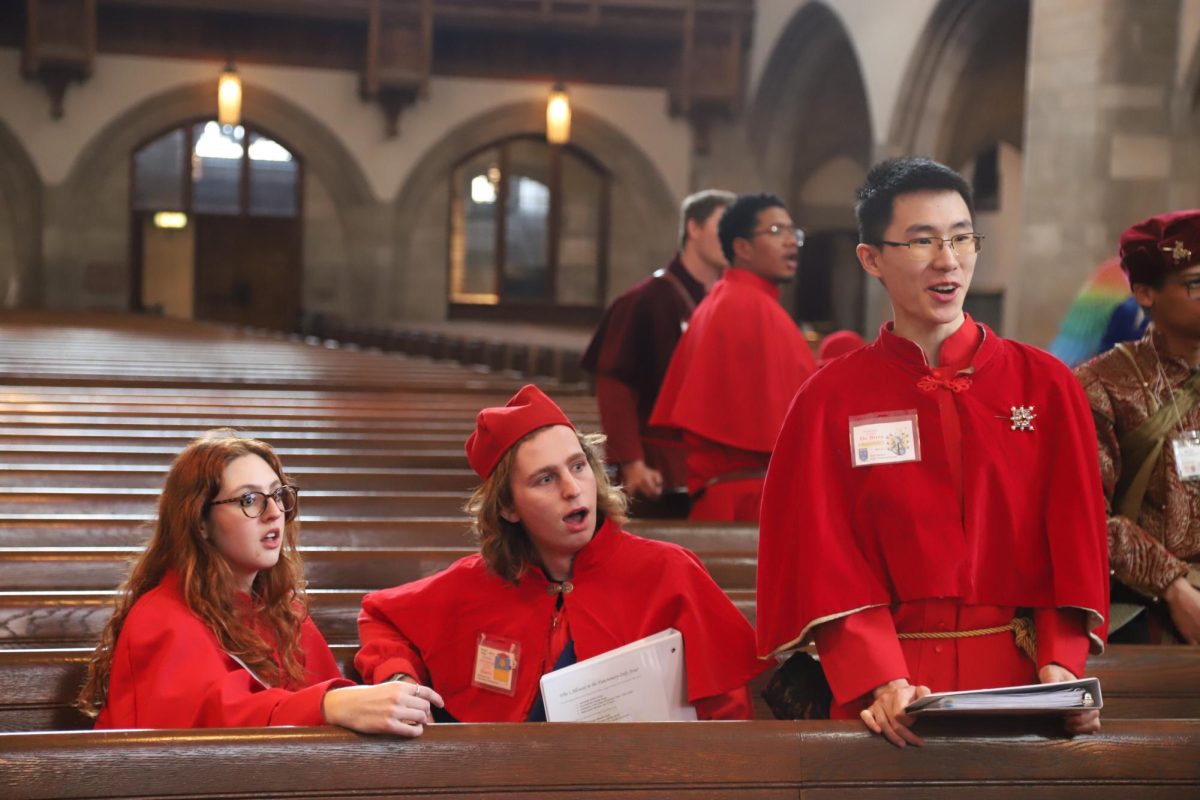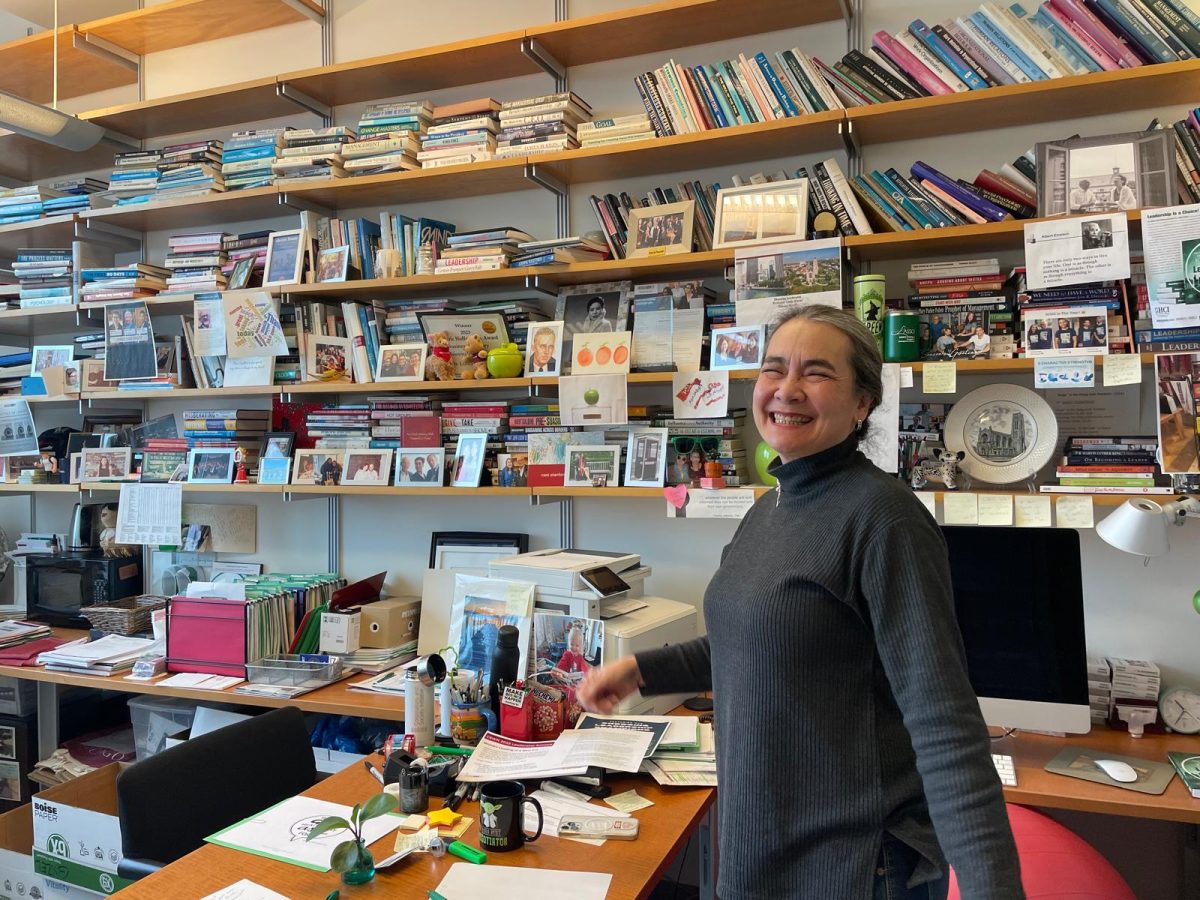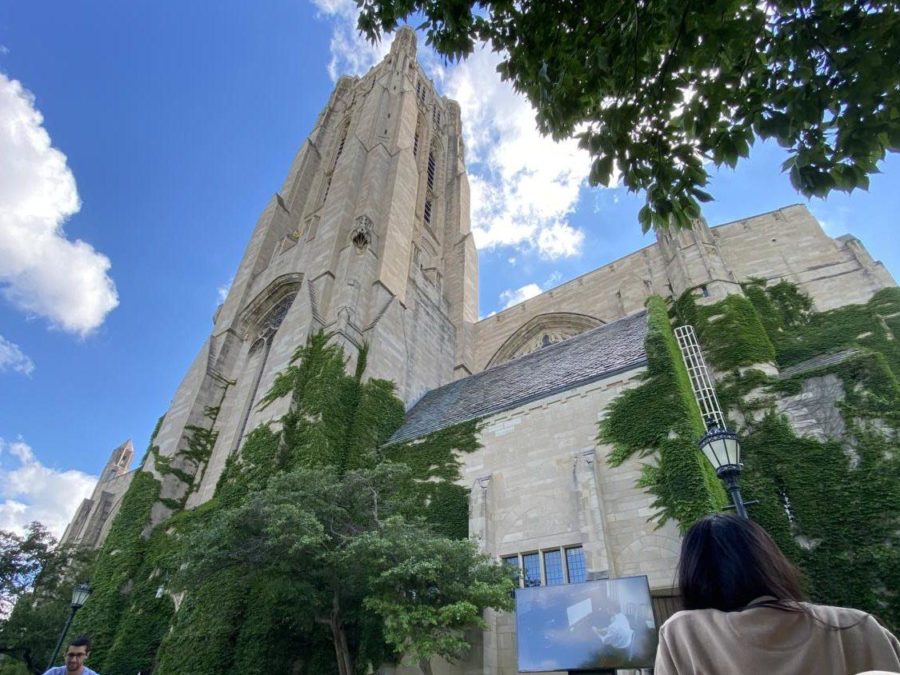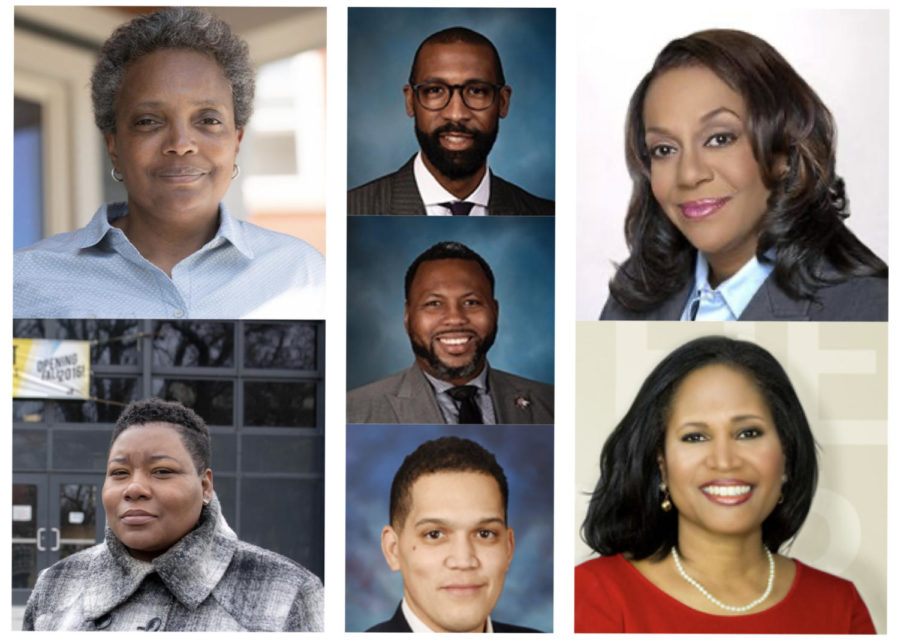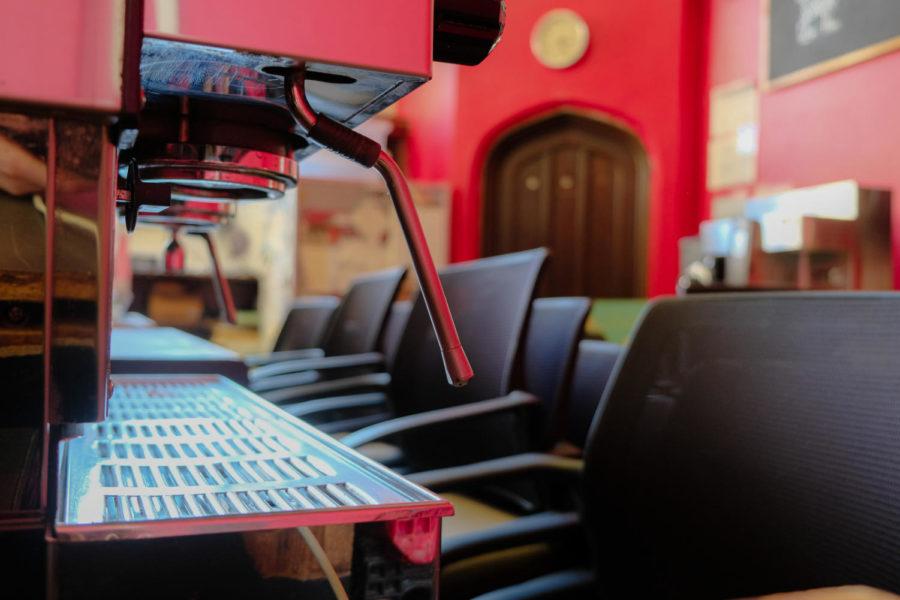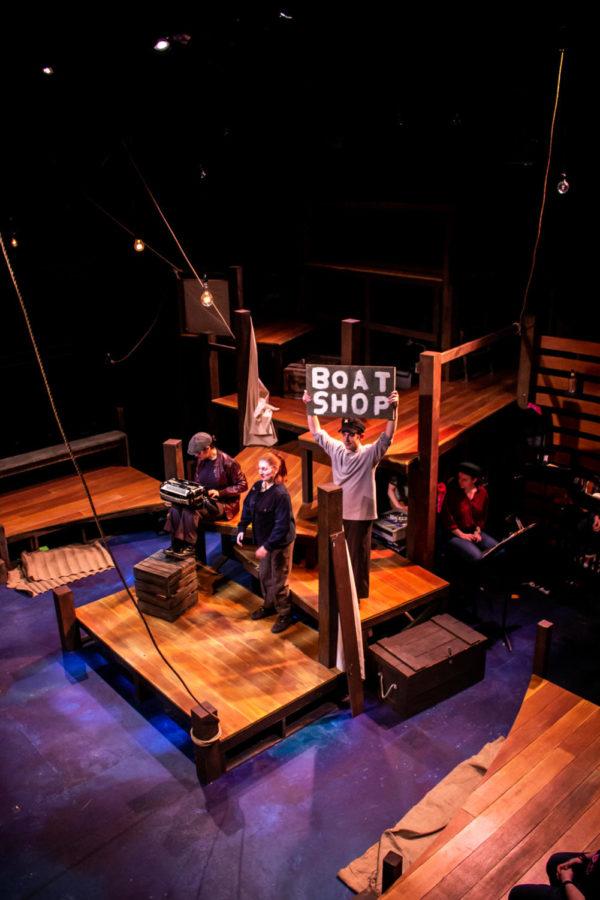Most students don’t apply to college from a government computer while deployed in the Philippines. Then again, most students don’t start their college courses merely five weeks after leaving the U.S. Marine Corps.
But that was how Colin Augustson, a second-year, arrived at the University of Chicago. And he’s not alone.
For a handful of students in the College, the journey to UChicago doesn’t follow the standard path of applying to college during senior year, enrolling the next fall, and graduating four years later: They enter after serving in the United States military.
The Veteran Scholars Program, now beginning its third year, has brought a distinct generation of students to the College. When the Class of 2025 arrives on campus this fall, UChicago’s Veteran Scholar cohort will include more than 50 students who have served in the Army, Navy, Air Force, Marine Corps, and Coast Guard.
The Advent of the Veteran Scholar
Though novel in the context of the College, the Veteran Scholars Program is not the University’s first foray into supporting veterans. In 2011, three years after the U.S. instituted the Yellow Ribbon Reintegration Program (YRRP), the Booth School of Business began offering $10,000 scholarships to qualifying veterans on top of federal support through the Department of Veterans Affairs. The school’s support has since increased to a maximum of $30,000.
In 2016, Marine Corps veteran Eric Gleacher (M.B.A. ’67) made a $10 million gift to establish the Gleacher Veteran Scholars Fund, which helps veteran students “bridge the gap between the benefits they have earned from the government and the remaining costs associated with receiving their M.B.A. degrees from Booth.” Inspired by Gleacher’s gift, the Harper Family Foundation made its own $10 million donation to Booth in 2019 to establish another scholarship fund. Veterans make up 7–8 percent of the total student population at Booth.
In the 2015–16 school year, veterans comprised about 6 percent of the U.S. undergraduate population. But further studies revealed that veterans were sorely underrepresented at selective colleges and universities. A 2017 survey by Inside Higher Ed columnist Wick Sloane showed that the 36 most selective colleges in the United States enrolled only 722 of the nearly 900,000 veterans who obtained support from the Post-9/11 Veterans Educational Assistance Act of 2008 or the YRRP, with Columbia University’s School of General Studies enrolling 422 of them. The University of Chicago did not indicate veteran enrollment at the time.
These low figures inspired the Posse Foundation, a national nonprofit that aims to bring a more diverse student population to higher education institutions, to start its Posse Veterans Program. The organization then helps partner schools admit a group of veterans—called a “posse”—to their incoming class each year.
Vassar College became the first school to partner with Posse, bringing 11 veterans to its campus in Poughkeepsie, New York, in autumn 2013. Wesleyan University, Dartmouth College, and the University of Virginia joined next, enrolling their inaugural Posse cohorts in 2014, 2016, and 2018, respectively.
In the summer of 2018, the University of Chicago announced its own partnership with Posse. The application process for prospective veteran scholars involved a series of steps intended to winnow the cohort.
“You apply to Posse, you get accepted to Posse, then you have to apply to the school. And then—and this is what tripped a lot of my community college professors out—you actually fly to New York [City] to get interviewed at Posse with no guarantee that you get a slot,” third-year Ricky Holder said. Posse and the University have since dissolved their partnership.
Holder found out he had been accepted to the College in December, the weekend after he finished the interview process. He, along with 13 peers, joined the Class of 2023 as part of the University’s first cohort of Veteran Scholars.
At the University, Holder saw an opportunity to lay the foundation for a career in public policy, a path he chose in part due to his personal background.
Holder grew up in San Bernardino, California, spending 10 years in the foster care system after his mother went to prison when he was nine years old. His three brothers also found themselves tangled in the juvenile justice system.
At the time Holder graduated high school in 2011, California law stated that children over the age of 18 were ineligible for foster care. Facing homelessness, Holder decided to enlist in the Navy, serving for six years as an information systems technician.
“The one thing the military did was provide me a little bit more time to figure things out,” he said. “Being in the foster care system, I never really considered what happened—like, why did my mother fall into the situation she fell in? Why did my brothers [fall] into the situation they fell in? So the military allowed me to reflect and have some introspection about what I wanted to do.”
Holder had always intended to leave the military to pursue higher education, so after leaving the Navy in November 2017, he enrolled at Foothill College, a community college in Los Altos Hills, California, with the plan to transfer to a four-year institution later on. Outside of class, he leveraged his background in technology by working in the lab at Singularity University, a company offering educational programs and business consulting.
Not long into his first semester at Foothill, where he was studying economics, Holder applied to the Warrior-Scholar Project, a summer program offering one- and two-week academic programs at elite colleges and universities to veterans and military members transitioning to civilian life. He was randomly matched with the University of Chicago and was immediately drawn to its rigor, even though he had not heard of it before.
“If you want to go through a four-year-long intellectual bootcamp, this is where you want to go,” he said.
The Warrior-Scholar Project has played a role in other veterans’ journeys to the University, too. Matthew Stark, one of Holder’s classmates, attended the Warrior-Scholar Project boot camp at University of Notre Dame in the summer of 2018.
Stark, who enlisted in the U.S. Army’s 75th Ranger Regiment in 2014, initially wanted to attend Arizona State University after completing his service, but while at the program, he was inspired to choose a “reach” school, which in his case was the University of Chicago.
He was also encouraged to apply to college by Connor Bednarzyk, a platoon leader in Stark’s infantry regiment and one of his mentors.
“When I was sitting down and having a conversation with Connor, he told me you can find this passion, this sense of purpose, this almost struggle that we all strive for in the military, you can find that other places [like at school],” Stark said. “That lit the fire under my butt to apply, take that risk, and really better myself.”
In September 2018, Bednarzyk lost his life in a training accident. He was not around to see Stark submit his application, complete the Posse process, or receive his acceptance letter.
Stark, who recently received one of two Five Foundation scholarships in Bednarzyk’s name, spends his extracurricular time mentoring prospective veteran students, hoping to help others just as Bednarzyk helped him. He is an ambassador of the Collegiate Access Program at Army Ranger Lead the Way Fund, where he works to get members of the 75th Ranger Regiment into college, especially into Ivy-plus schools. Stark also keeps in regular contact with the University’s admissions office and with Associate Director for Veteran Services Beau Butts, periodically recommending them students who he believes would excel at UChicago.
“A lot of our high school transcripts might not reflect that, so getting that one-on-one understanding of how someone’s changed from high school and communicating that to admissions is probably the most vital thing that I do in some of my mentorship and nonprofit volunteering.”
Above his desk, Stark keeps a picture of three people he knew who died while serving. He told me the photos have motivated him during the COVID-19 pandemic and online classes.
“My biggest fear is not applying myself and not achieving everything I can, especially when there’s so many people that have died and don’t have this opportunity to kind of fulfill their ultimate purpose and really give 100 percent,” Stark said. “It’s really just a key motivation to keep pushing, especially with COVID, when purpose seems very low. With online classes, you just get up, stay at your desk, and kind of go throughout your day. It’s not very exciting, it doesn’t seem very purposeful, but keeping in mind the end goal is really important.”
Finding Their Feet in the Classroom
For UChicago’s veteran student population, the transition to online classes came with additional complications. For one, most of them graduated high school in the early 2010s, before digital setups proliferated in the classroom. Additionally, in the military itself, some enlisted recruits do not have regular access to their mobile phones, so they do not rely on them in civilian life.
“Online classes don’t really give us military people the same feel. The military’s kind of Stone Age, so we’re not very used to being online. I know [in] my unit, I couldn’t even take pictures for most of the time. I wasn’t able to really use my phone like normal people,” Stark said. “When you’re in the military, you get used to just not having your phone. You’re on deployment, you leave your phone somewhere else. You go to the field for two, three, four weeks, and you don’t have it.… The technology is definitely a lot less integrated into our everyday lives, so I felt making that social connection over Zoom and stuff was very difficult.”
Most of UChicago’s veteran scholars live off campus at Vue 53, an apartment complex on East 53rd Street, in units provided by the University. Though this allows them to interact with one another more easily, it does create distance between them and their classmates living in University residence halls.
“A lot of those friendships that young folks make, they make in the dorms, they make on campus, they make doing all those things,” Holder said. “I love my life, I love being married, I have my dog here, can’t have a dog in the dorm! I love all those components, but it’s definitely something I think about. [Living in a college dormitory] is something I’m never going to have, but it’s something that’s for better or for worse still romanticized in American culture.”
But other veteran scholars contend that they’ve already had that sort of experience—just not on a college campus.
“I did feel like I was missing out on making friends at that critical age, but I kind of had a parallel experience and I didn’t realize it so much at the time. We lived in the barracks, which are kind of like dorms, with people generally our age,” second-year Ivy Yahner said.
Yahner’s path to UChicago differs from those of many of her peers in the Veteran Scholars Program. After graduating from high school in Chambersburg, Pennsylvania, in 2012, she took a gap year, during which she taught herself sign language and worked her first job at Staples. She also applied to the University of Chicago but did not get in.
“[During the gap year, I was] exploring my interests and making sure that whatever path I ended up going down was something I was really committed to,” she said. “I didn’t end up committing to any other college because I wasn’t ready at that time, I don’t think, to take on that much debt for a career I wasn’t sure about yet.”
Yahner knew she wanted to study languages, but she wasn’t sure going to college was the right choice at the time. Instead, she turned to the Defense Language Institute Foreign Language Center, a specialized branch of the U.S. Army wherein recruits are paid to learn a language for use in military operations. After completing the entrance examinations, she was matched with Mandarin Chinese—one of the most difficult languages offered by the Army.
Yahner also had to pass a physical fitness test, which she found daunting as a self-described bookworm. “I remember doing my first push-up ever and thinking that there was no way I could do it,” she told me during our conversation, cracking a smile.
In February 2015, Yahner travelled to Taiwan, where she continued her studies in an immersive environment with teachers who grew up in China or Taiwan.
“They were able to contribute a point of view that I had never experienced before. Learning about history, even world history, in high school, I don’t feel like [I learned] a lot in depth about Chinese history specifically, and just to get that point of view from people who experienced it and lived it was…shocking, in a way, because we just learn about America and think about America as the center of our universe.”
She returned home in 2019 and proceeded to apply once more to college. Now armed with a new language and a real-world application for her academic goals, she was admitted to the University, seven years after her first attempt, as part of its Class of 2024.
“My time in the military really challenged what I thought I was capable of. If you had told me that I could learn Chinese Mandarin to a level of functionality in less than two years, I would have thought that seemed a little bit out of reach, but somehow they have a system in place that helped us learn [it],” Yahner said.
“I took statistics this past year, and that was really hard for me.… I just figured out how to get a system in place that would help me to learn it and just never even [thought], ‘Oh, I can’t do this, this is really hard,’ or, ‘I’m not going to pass.’”
The Veteran Scholars Program offers dedicated programming geared toward acclimating veterans to life at the College. These include social offerings like kayaking on the Chicago River and an academic transition program in math and writing.
Augustson, the student who applied from the Philippines while deployed, said that the transition program helped him adjust to the rigor of college-level academic discussion as well as the new norms of the Zoom classroom. Having returned from the Marine Corps on August 23, 2020, Augustson expected to face culture shock ahead of his first day of classes on September 29.
“In transitioning, I was very worried that I was going to bring aspects of that culture that weren't appropriate or suitable for higher education,” Augustson said. “[It was important] to have those people there to be an intermediary and be a comfortable space for me in transitioning back into civilian life as I’m doing a very rigorous education virtually, which was something I’d never really done.”
Augustson did not apply to UChicago intending to join the Veteran Scholars Program; in fact, at the time he applied, he didn’t know it existed. On his application, he only indicated his military affiliation by checking a box that asked whether he had served and mentioning it briefly in one of his application essays. While his application was being reviewed, he received a phone call from Butts.
“That call, obviously, was amazing because he really told me, ‘There’s a lot more going on for veterans than you’re aware of, and I can work with you on your application.’ I didn’t even know I needed to apply as a transfer student. I just applied as an [incoming] first-year,” Augustson said.
Augustson, an anti-tank missileman in the Marine Corps, had long planned to serve in the military after high school. Several of his relatives are veterans, and during our conversation, Augustson told me that he and his twin brother chose the military when asked about their dream careers in kindergarten. By sixth grade, they both knew they wanted to be Marines.
But when Augustson, 17 years old and freshly graduated from high school, went to enlist, recruiters found a perforation in his right tympanic membrane—a hole in his eardrum. He had to wait six months to receive the surgery requested by the military and then almost two further years while his medical waivers were sorted out. In the meantime, he worked at a landscaping company and at McDonald’s before spending nearly a year as a full-time emergency medical technician in the Chicago area, staying close to his hometown of Grant Park, Illinois.
Augustson always valued the community present in military spheres, even if he discovered on his first day of boot camp just how different it would be from his small-town upbringing.
“You get off of a bus, and the next thing you know, you’re living with 100 individuals in a huge squad bay. I come from a small town. There’s maybe [1,200] to 1,500 people in my town. My high school graduating class was 38 people,” he said. “To go out and have that experience and to meet so many people and to be able to trust them day one…definitely just blew my worldview apart.”
Barriers to Higher Education
As World War II drew to a close, Congress passed the Servicemen’s Readjustment Act of 1944, better known as the GI Bill. Enacted in part to avoid issues stemming from what many considered inadequate support for soldiers returning from World War I, the GI Bill offered tuition payments to millions of World War II veterans attending high school, college, or vocational school.
The GI Bill had a revolutionary impact on higher education: In 1947, just three years after its passage, veterans comprised 49 percent of all students admitted to U.S. colleges and universities. By the time the original bill expired in July 1956, 7.8 million veterans, nearly half of the 16 million eligible, were using it to pursue education or training.
There have been similar programs set up since, most notably the Post-9/11 Veterans Educational Assistance Act of 2008. Commonly known as the Post-9/11 GI Bill or simply as the new GI Bill, it offers free tuition to a four-year public college for veterans who served on active duty for at least three years since September 11, 2001.
A 2020 study showed that for the 2015–16 school year, 43 percent of veteran undergraduates were using the education benefits provided by the bill. Augustson told me that for some students, the bill itself does not offset other factors that may lead students away from college.
“Sometimes people view the [new] GI Bill as this golden ticket of, ‘You’ve made it now. You’ll have free college, and you can use that,’ but really, you have to think about the fact that people are going back to the same socioeconomic conditions that they came from. They’re going back to the same friends, the same families, so in a lot of ways, the things that…maybe played into a decision not to pursue higher education originally, those factors are still going to be in place,” he said.
Augustson has several military friends who have taken up contracting work, vocational jobs, or positions at family-owned businesses. He admits that he didn’t expect to pursue higher education so soon; he originally planned to serve in the Marine Corps for 20 years. Being at the University now, he especially values opportunities to hear from and network with veterans who have leveraged their military backgrounds and undergraduate degrees into successful careers, citing veteran-oriented visits from companies like Gartner, AQR Capital Management, and JPMorgan Chase as particularly insightful.
Several of the veteran students with whom I spoke effused about the unique sense of community they felt in the military. But the Veteran Scholars Program has provided them with another community, one that revolves around learning and growth. For Stark, who was initially hesitant to share his veteran status in the classroom, this sense of community within the University inspired him to open up about the unique perspectives he holds as a veteran in classes.
“My first year, every day [that] I would talk, 30 minutes after class I’d be stressing out about what I said. Was it smart enough? What did other people think of it?” Stark said. “This third year, with everybody being so inclusive at the University and all the students being amazing and open to different opinions, now I actually feel comfortable sharing a little bit more about my veteran status in classes. I feel a lot more comfortable sharing my opinions and actually getting into these conversations and making a contribution versus just getting that credit for participation.”
Their contributions are especially valuable, Stark believes, when they share firsthand experiences gained from the military.
“We have a different lens that we view things through. In international relations classes that I’ve taken, we can give a different real-world perspective on certain conflicts, or we understand certain differences in mission planning,” he said. “In places like the humanities, we have a lot of emotional experience dealing with death, travesty, all these more intense emotional feelings. We can tap into that a lot easier, and we’re a lot more comfortable sharing that with individuals.”
The contributions from each veteran reflect how the military has shaped them. Augustson is quick to remember where he came from, especially when he faces difficulties.
“At times there’s things where I look back [and think], ‘You could be doing this that you had to do, or you could be sleeping in that place you had to sleep,’” Augustson said. “Even if it’s a really long night studying at the library or if I really have to pull an all-nighter or something, it’s bad, but at the end of the day it’s a lot better than some of the experiences I’ve had [in the military].”
“I was coming back into school not that confident…in my ability to remember how to study well and how to do these things. But when I would be studying for an exam or something or putting those extra hours into writing a paper, I think that the confidence came from [knowing that] if I am intentional about this and if I do this as well as I can—even if I blow the test, even if I don’t write a good paper—I can walk away from it knowing that I tried my best.”


